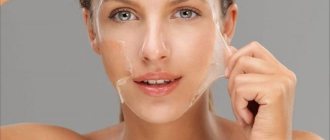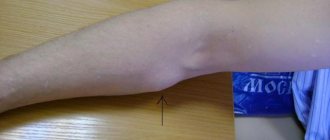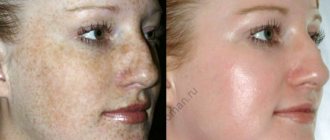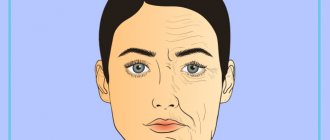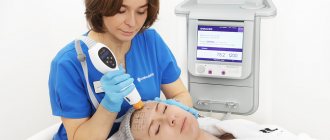Lipolitics: what are they?
Lipolitics are preparations made from natural enzymes that are injected into the subcutaneous layers with thin long needles to a depth of up to 3 cm. In this case, the correctness of the procedure plays a big role, since the drug must get into the fat layer, and not into the muscle, for example, since the latter is fraught serious consequences.
The basis of lipolytics is often a special form of phosphatidylcholine, a substance that is produced by the liver and is responsible for the metabolism of fats in the body. There are direct and indirect lipolytics.
The first, getting into fat cells, literally “dissolve” them, after which the breakdown products naturally leave the body. The latter affect the metabolic rate and microcirculation, which ultimately creates the effect of natural weight loss. Straight ones are more suitable for figure correction, indirect ones - if you need to get rid of a double chin, large cheeks, a small fold of fat, etc.
Composition and types of drugs
Direct lipolytics contain substances that destroy the cell walls of adipocytes. The list of active components of meso-cocktails for weight loss includes:
- Phosphatidylcholine;
- Sodium deoxycholate;
- MRX complex containing levocarnitine, dandelion extract, lidocaine, benzpyrone.
Phosphatidylcholine is a direct lipolytic from the group of lecithins. The molecule consists of choline and 2 types of fatty acids. Contained in soybeans, eggs, mustard seeds.
Activates redox processes in the body, regulates protein, lipid and energy metabolism.
Deoxycholate is a substance that enhances the effect of phosphatidylcholine. In the body it is naturally present in bile. Breaks down fats during food digestion, acting on intermolecular bonds. Removes excess fluid from the body.
The MPX complex destroys adipocyte membranes and binds organic acids. Reduces swelling, pain and inflammation, improves microcirculation in tissues.
Features of the procedure
To obtain the desired effect, a course of lipolysis of 3-8 procedures is usually prescribed. They are carried out every one to three weeks. In this case, no special preparation is required: the doctor only clarifies what health problems the patient has. Lipolitics are not used if there are such contraindications:
- young age (up to 18 years);
- pregnancy and feeding the baby;
- bleeding disorders;
- presence of neoplasms;
- diseases of the kidneys, liver, endocrine system.
If there are no contraindications, the specialist takes measurements of those parts of the body into which the drug will be injected - this is necessary to monitor weight loss in the future. After this, the drug is injected into problem areas - the composition and depth are selected taking into account individual characteristics.
Features of the procedure
Cosmetologists have extensive experience in using drugs containing sodium deoxycholate and phosphatidylcholine for injection correction of local fat deposits. However, no one is immune from the development of complications, in particular vascular ones. But in what cases and for what reasons can they happen? What measures need to be taken immediately if an acute situation arises? And what conclusions do doctors make when analyzing such cases?
In cosmetology, preparations containing sodium deoxycholate and phosphatidylcholine are used in lipolytics to correct local fat deposits in the area of the double chin, anterior abdominal wall, arms, thighs, and breeches.
When working with sodium deoxycholate, the following undesirable effects and complications may develop (phosphatidylcholine usually does not cause such reactions):
- inflammatory phenomena - if the rules of asepsis and antisepsis are not followed;
- sclerosis and fibrosis of muscle tissue - in places where the drug would be injected too deeply - to the muscle layer);
- allergic reaction;
- formation of infiltration and compaction;
- the appearance of areas of skin necrosis - when the drug is administered into the vessel.
The literature also describes a single case of alopecia in a man after injection of sodium deoxycholate into the submental area.
Vascular complications in cosmetology are recognized by doctors as one of the most pressing and complex problems. That is why I would like to dwell on a clinical case from my practice, where there was a vascular complication with the formation of an area of skin necrosis after the administration of a drug with sodium deoxycholate.
Clinical case
Patient V., 37 years old, came to me for the correction of local fat deposits (LAD) in the area of the anterior abdominal wall.
From the anamnesis: somatically healthy. Previously, correction was carried out using manual massage and hardware techniques. The patient was not satisfied with the result.
Prescriptions for the correction of left venous fluid: a course of 6 procedures of injection lipolysis with a drug containing 2.5% sodium deoxycholate and 5% phosphatidylcholine. The procedures were performed once every 2 weeks.
At the final, 6th procedure, at the time of injection of the drug, the patient felt a sharp, uncharacteristic pain. Despite this, the drug was administered in a volume of 0.1–0.15 ml, sharply and quickly - in order to reduce the time of administration. Instantly, a deathly pale spot appeared on the skin of the abdomen, which in 5-6 seconds reached a size of 10 x 15 cm. Apparently, the following happened: the volume of lipolytic administered sharply and quickly disrupted the blood flow in the pool of a fairly large artery of the subcutaneous fat ( branch of the inferior superficial epigastric artery).
In this case, immediate measures must be taken to eliminate acute ischemia. As a result of delay, an area of extensive necrosis may occur leading to a scar, since sodium deoxycholate, being a universal cytolytic, causes disorganization of the cell membrane of any tissue into which it was introduced.
To relieve acute ischemia, it is necessary to achieve vasodilation and increase blood flow to the affected area, and to protect ischemic tissue.
Therapy of acute ischemia
Immediately after the first symptoms appeared, an intense massage was performed on the affected area, a warming compress (a heating pad with warm water) was applied, as well as nitroglycerin ointment to dilate blood vessels and increase blood flow.
After 10 minutes, the skin color changed from deathly pale to violet-crimson. The size and outline of the spot completely coincided with the original one. An intradermal and subcutaneous injection of the drug "Malsmon" in a volume of 4 ml was made to improve cellular respiration and metabolic processes in the ischemic area of the skin affected by sodium deoxycholate.
The patient was left under observation for 1 hour and was subsequently sent home with a recommendation to apply nitroglycerin ointment twice more at an interval of 2 hours.
The size and outline of the ischemic spot immediately after the administration of lipolytic.
A spot of developing necrosis the next day after the administration of lipolytic.
The next day, a dark purple spot appeared in the center of the affected area (an area of developing necrosis). An injection of the drug "Melsmon" 4 ml was repeated at different levels: dermal, subdermal and into the subdermal tract. In addition, hyperbaric oxygenation (HBO) was prescribed to enrich the cells with oxygen (3 procedures). Taking into account the area of the lesion, prophylactic antibiotic therapy was also prescribed - Clotrimycin 500 mg/day, 7 days (in its absence, a secondary infection may occur).
On the 3rd day, Actovegin was added to the treatment, slowly, in course No. 5 (once a day) to improve energy and oxygen metabolism in the affected tissues and accelerate regeneration.
A spot of ischemic tissue on the 5th day after lipolytic administration.
A spot of ischemic tissue on the 9th day after lipolytic administration.
Subsequently, during treatment, the size of the lesion slowly decreased from the periphery to the center. An area with complete loss of sensitivity measuring 2 x 2 cm appeared in the center of the lesion. A painless compaction of subcutaneous fat the size of a walnut was determined by palpation.
The patient did not critically assess the severity of the condition: 3 Actovegin injections were performed instead of 5 (she did not come for the rest; then Actovegin tablets were prescribed for 1 month - according to the patient, she completed this prescription), HBOT - 1 procedure instead of 3 (the patient also did not come to the other 2).
As a result of the treatment, the area of aseptic necrosis slowly transformed into an atrophic scar.
To correct the compaction of the pancreas, an injection of collagenase was made with a pronounced positive effect (almost complete resolution of the compaction on the 3rd day) (in the 2nd photo - 3.5 months after the procedure).
At the moment, a secondary pale purple spot measuring 2 x 3 cm is detected on the skin of the anterior abdominal wall; in the center there is an atrophic scar measuring 0.5 cm in diameter. Skin sensitivity has been restored.
Transformation of the area of aseptic necrosis on the 11th day after lipolytic administration.
Necrosis was completely resolved 3.5 months after the procedure.
The current state of damaged tissues.
Situation analysis and conclusions
– Despite the apparent simplicity of administering lipolytic drugs, we must remember that there are no absolutely safe zones either on the face or on the body.
– The considered clinical example emphasizes the importance of knowledge of the topographic anatomy of the face and body.
– Attentiveness to the patient’s reactions to any manipulation should not weaken at any stage of the procedure (for example, in this case, the administration of the drug was continued despite a change in the patient’s behavior - sharp pain that was uncharacteristic for her and for this procedure).
– All manipulations should be performed using techniques that are as safe as possible for a particular patient.
– It is important to pay more attention to ensuring that the patient adequately understands the problem (in the situation described, the doctor was unable to convince the patient of the severity of the complication).
Tatyana Zhiboreva, cosmetologist, head of the thread lifting center “Gravitatsii.net”, Ryazan
Rehabilitation
More than the risk of the procedure if performed correctly is minor swelling and bruising at the injection sites. In this case, dry, cold compresses will help. Your temperature may also rise.
To minimize the consequences and promote lasting results, in the first week after lipolysis you need to drink more fluid (up to 2.5 liters per day) - this will help the body get rid of waste products more efficiently. You should also follow the doctor's recommendations, which are as follows:
- for a couple of days you need to completely give up alcohol;
- for a week, visiting baths and saunas, sunbathing are prohibited;
- If the face has undergone correction, then in the first days you can go outside only with the use of protective equipment.
During the rehabilitation period, it would be good to resort to massage, thermolifting and other procedures that will help speed up the breakdown of fat (the doctor will tell you more about this).
Another important point: for the results to be truly lasting, you should switch to proper nutrition and exercise regularly. Moreover, this should become a habitual way of life, since gaining even a couple of kilograms will negate the entire process of losing weight. First of all, this concerns the face. In this case, “dissolved” fat and extra centimeters will remain a thing of the past forever.
What effect can you expect
The best results from using Revital Celluform can be achieved when treating the initial stages of cellulite.
According to reviews of Revital Celluform lipolytics, improvements are noticeable after 1-2 sessions.
Patients note:
- Reducing the volume of the body or face in the area of injection;
- Disappearance of signs of cellulite or reduction in their severity;
- Skin tightening, disappearance of double chin, bags under the eyes;
- Smoothing wrinkles;
- Increasing skin density and elasticity.
To achieve a lasting result, you need to do from 4 to 8 Revital Celluform procedures. The interval between sessions is 10 days.
What are the benefits of this type of weight loss?
Thanks to lipolytic injections, you can quickly solve the problem of extra centimeters before an important event or if a healthy diet and exercise do not give the expected result. But you need to understand that weight loss should be within reasonable limits: if you are obese, injections will definitely not help. Lipolitics will help correct the oval of the face and make the skin denser.
An undoubted advantage is the ability to minimize the appearance of cellulite, improve blood flow and lipid metabolism in tissues. In addition, after the procedure, you can almost immediately lead a normal lifestyle: walk down the street, work, etc. (without the abuses listed above).
The procedure itself may not seem very pleasant, especially to those who are afraid of injections, but almost all drugs contain painkillers.
Other types of lipolytics for weight loss
Besides injections, there are other forms of this drug, but they are less effective. These include:
- Cream. It also contains vitamins and other useful substances, but you should not expect significant results from the cream. The reason is simple: lipolytics in this case, unlike injections, penetrate exclusively into the upper layers of the skin. As a result, within three months it will be possible to improve the condition of the skin, but the reduction in the fat layer will be insignificant - about 2-3 cm.
- Cocktails, capsules, tablets. They can be purchased at pharmacies or sports nutrition stores. A prerequisite is to combine the intake with regular physical activity: lipolytics will enhance the fat burning process. The minimum course of admission is 3 months.
Slimming cream
Thus, injections are the most effective way to say goodbye to extra centimeters and kilograms, guaranteed and in a short time.
Why is it important to contact a highly qualified specialist?
Despite all the advantages of the procedure, it is important to carry out lipolysis in a clinical setting, where suitable conditions are created and only certified drugs are used. Among them:
- “Aqualix” - used for correction in any areas; for a lasting visible result (minus 25-35% of body fat) with a cumulative effect, 2-5 procedures are enough.
- "Dermahil LL" - in addition to phosphatidylcholine, stomatomedin, carnitine, which are responsible for the breakdown and effective removal of breakdown products, contains hyaluron and amino acids, which has a positive effect on the general condition of the skin.
- "Dermastabilon".
It is equally important to choose the correct composition of the lipolytic and the depth of its administration. This can be done by a doctor with special education and the necessary experience. Otherwise, instead of getting rid of extra centimeters and returning the skin to its former attractiveness, you may end up with an abscess.
Preparation
Before starting the course of injections, the doctor examines the patient.
During the consultation, the general state of health and possible contraindications are clarified. The doctor immediately determines the essence and severity of the problem, the area of the area that needs correction.
If necessary, the doctor may prescribe additional examination.
A few days before the start of the course it is recommended:
- Stop taking alcohol and medications. If the patient takes medications as prescribed by a doctor, it is necessary to take a break of at least 2 weeks;
- Do not visit saunas, swimming pools and solariums;
- Do not abuse salty and spicy foods.
The procedure does not require special preparation or hospitalization.
